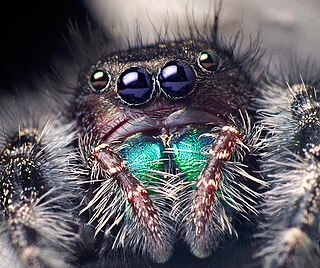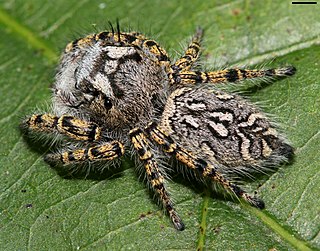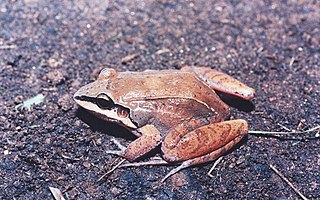
The white-throated spadebill is a tiny passerine bird in the tyrant flycatcher family. It lives in the tropical Americas.

Ophrys insectifera, the fly orchid, is a species of orchid and the type species of the genus Ophrys. It is remarkable as an example of the use of sexually deceptive pollination and floral mimicry, as well as a highly selective and highly evolved plant–pollinator relationship.

Phidippus is a genus in the family Salticidae. Some of the largest jumping spiders inhabit this genus, and many species are characterized by their brilliant, iridescent green chelicerae. Phidippus is distributed almost exclusively in North America, with the exception of two exported species. As of January 2021, there were about 80 described species in the genus. Species previously described in Phidippus which are found in India and Bangladesh do not belong in this genus.

Calotes mystaceus, the Indo-Chinese forest lizard or blue crested lizard, is an agamid lizard found in China, South Asia and Southeast Asia.

Leptodactylus fragilis, known under many common names such as the Mexican white-lipped frog, American white-lipped frog or simply white-lipped frog, is a species of leptodactylid frog. Its distribution ranges from the Lower Rio Grande Valley of Texas in the United States south through Mexico and Central America to Colombia and Venezuela. It is often—wrongly—referred to as Leptodactylus labialis(Cope, 1878), which is a junior synonym of Leptodactylus mystacinus.

Erawan National Park is a 343,735 rai ~ 550 square kilometres (210 sq mi) park in western Thailand in the Tenasserim Hills of Kanchanaburi Province, Amphoe Si Sawat in tambon Tha Kradan. Founded on August 14, 1975, it was Thailand's 12th national park.

Phidippus mystaceus is a species of jumping spider that is found in North America. Females grow to about 1 centimetre (0.39 in) in body length.

Leptodactylus mystaceus, also known as the common toad-frog, is a species of frog in the family Leptodactylidae.

Leptodactylus spixi is a species of frog in the family Leptodactylidae. It is endemic to eastern Brazil and occurs in the Atlantic forests of the Bahia, Espírito Santo, and Rio de Janeiro states. The specific name spixi honors Johann Baptist von Spix, a German naturalist who worked in Brazil. Prior to its description, this species had been referred to as Leptodactylus mystaceus(Spix, 1824). Common name Spix's white-lipped frog has been coined for this species.
Guaribas Biological Reserve is a biological reserve in the state of Paraíba, Brazil.

Phrynocephalus mystaceus, also known as the secret toadhead agama and toad-headed agama, is a species of agamid lizard. It is found in southern Russia, Kazakhstan, and northwestern China (Xinjiang) and southward to northern Iran, Afghanistan, Turkmenistan, Tajikistan, Kyrgyzstan, and Uzbekistan.

The Draconinae are a subfamily of reptiles in the family Agamidae found in southern Asia and Oceania. Some taxonomists believe these genera belong to the subfamily Agaminae.
The Euphrates barbel is a species of cyprinid fish found in the Tigris-Euphrates river system.

Rhagio mystaceus, also known as the down-looker fly, downlooker snipefly and common snipe fly, is a species of fly from the family Rhagionidae.
P. mystaceus may refer to:

Calotes bachae or Cochinchina Lizard is a species of lizards in the family Agamidae. It is known from southern Vietnam and eastern Cambodia. Its range may extend into southern Laos.

Argogorytes mystaceus is a species of solitary wasp in the family Crabronidae.

Nysson spinosus, the large-spurred digger wasp, is a species of cleptoparasitic wasp of the family Crabronidae which is found in the Palearctic.

Phidippus pacosauritus is a species of jumping spider found in Mexico. It was first described by G. B. Edwards in 2020.
















